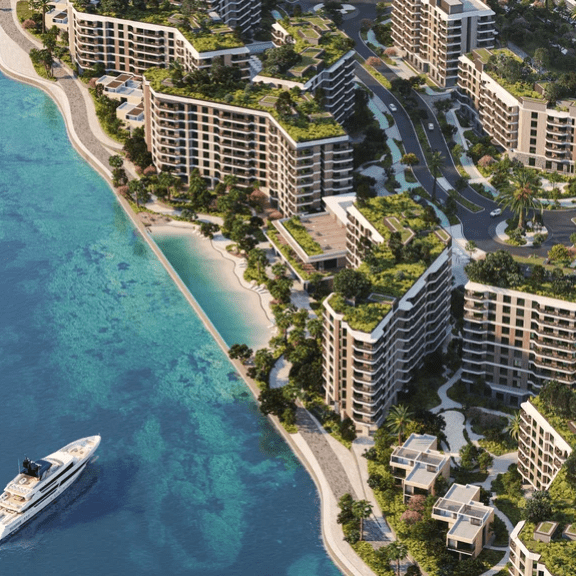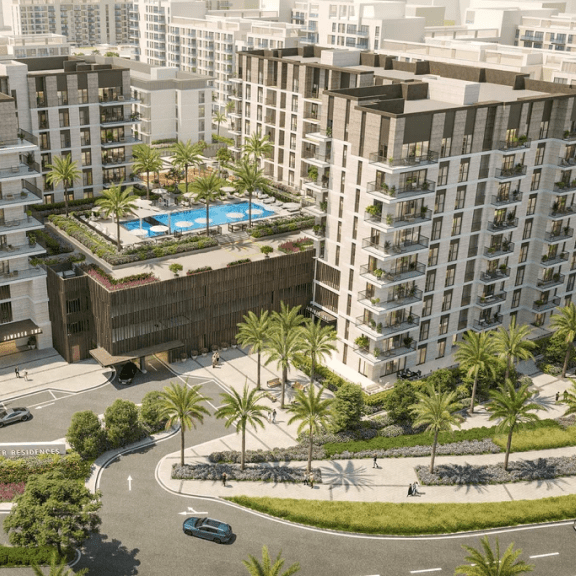Both UAE citizens and expats are eligible for a mortgage in Dubai to buy a property there. That said, banks tend to impose more stringent requirements on foreign borrowers, especially in terms of income levels. A foreigner will have to undergo an assessment procedure at the bank lender, take out life insurance, and comply with several other mandatory conditions.
Who Is Eligible for a Mortgage in Dubai?
Foreign citizens may take out a mortgage loan at a local bank to buy a flat or a house. However, the LTV ratios (loan-to-value ratio - the ratio between the loan amount and the value of the housing) and DBR (debt-burden ratio - the ratio between the borrower’s income and expenses) for foreign investors may differ from the ratios established for UAE citizens.
The LTV ratio helps determine the optimal amount of the loan and the size of the initial payment. You can borrow up to 80% of the price of the real estate as long as it does not exceed AED 5,000,000 (USD 1,361,450). If the property is more expensive, then the mortgage loan will cover at most 70% of the price. In other words, in the first instance you must contribute an initial payment of at least 20% of the price and in the second instance at least 30% of the price. At the same time, however, some banks finance only up to 50% of the price of real estate for non-resident applicants.
New buildings in the UAE
The DBR for a non-resident must equal no more than 50% of their monthly income. Depending on this ratio, the bank may vary lending terms and conditions (the amount, the timeline, and monthly payments) or refuse to grant the loan. Please bear in mind that the bank will deduct from the 50% any other loan liabilities of the potential borrower (for example, a car loan, consumer loans, and about 5% of all credit card limits). This is the first step that a bank will take before determining the maximum solvency of a client.
In any case, foreign citizens are only eligible for a potential mortgage in Dubai after confirming that they earn a stable income. However, there is a positive aspect here: the income can come from different sources, including salary, commissions, and income from the letting of residential or commercial properties. If the employer pays a housing allowance to a potential borrower, it is highly likely that a bank will take this into account when considering the mortgage application, and in some cases, may increase the amount of the loan on this basis. However, a number of banks expect the monthly after-tax income of the applicant to exceed AED 25,000 (USD 6,807).
The minimum age of an expat borrower is 21, the maximum age is 65 for employees and 70 years for the self-employed. The maximum term of a loan is 25 years. As a rule, however, banks approve shorter loans.
Photo: Annie Spratt (Unsplash)
What Documents Do You Need to Present to the Bank?
To be eligible for a mortgage, expats will have to present several documents to the bank. The standard package includes a valid passport (as an identity document), a salary certificate or a bank statement (to confirm one’s income). This is usually enough to apply for a mortgage. The preliminary application is approved within five business days.
Then the property search starts – you have two months to do this. Depending on the terms and conditions of the deal and the property price, the bank may request additional documents: a tax return, business licence, and audited financial statements (if the foreigner is self-employed). These documents are usually required if a borrower is buying very expensive real estate. In the case of a Dubai bank (and banks from other countries) it is important that all the borrower’s income has been obtained legally.
All the documents must be translated into English or Arabic.
Other Bank Requirements
A borrower must have life insurance to obtain a mortgage in Dubai. Usually, the bank lender will expect the borrower to take out a life insurance policy issued by the bank. The insurance is needed in cases where the borrower is unable to repay the mortgage.
The housing that the borrower wants to buy in Dubai using a mortgage must be located in one of the freehold zones where foreigners can legally own real estate. The property must be either finished or ready for commissioning within two years of the issue of the loan.
In a Nutshell
Not all banks are ready to lend to the self-employed: they prefer working with employees. So, before applying for a mortgage, clarify this issue with your chosen bank. It is better to start looking for a property after the lender approves your application, as a number of banks have a list of developers approved for mortgage financing, and it will be easier to get a loan for such a property.
Cover photo: Jonny Kennaugh (Unsplash)




